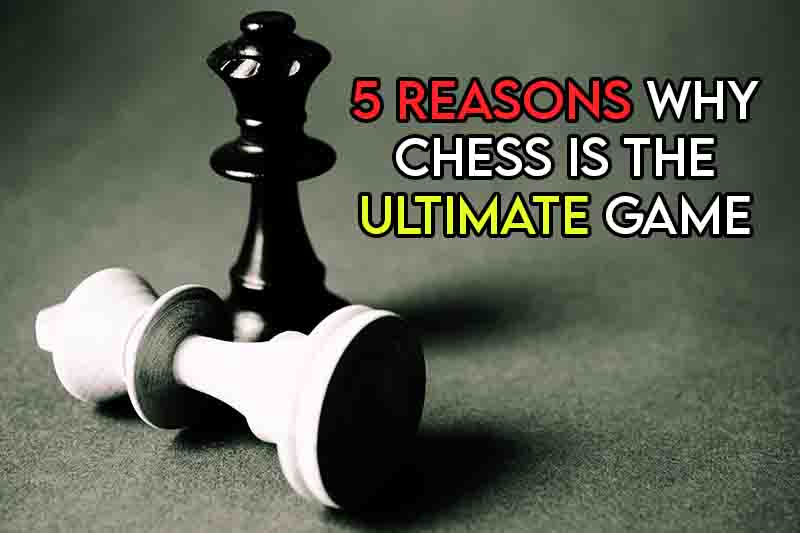It has been nearly three decades since an AI (Deep Blue) beat Gary Kasparov, a chess grandmaster, at his own game.
However, since then, Chess (as a pastime) shows no signs of slowing down in popularity, and in fact, it is only increasing in exposure and reach thanks to modern formats to play it on such as PC and console.
Basically, the interest to play strategy board games hasn’t died, the medium through which we engage them has changed.
In fact, one of the reasons why Chess is so enduring as a game (and even as a competitive sport) is mainly thanks to how rigid its rule structure is, and how non-random the elements that influence victory are.
Does this mean that Chess is the ultimate game then?
Well, maybe, and in fact, we’re going to list a few of the top reasons why we think it might just be.
1. Chess is the fairest game
You may have heard this before, but most people agree that chess is one of the fairest games in existence thanks to how rigid the rule structure is and the fact that both opponents will start with an equal opportunity to win the game.
There are no external factors or elements of randomness that can influence the outcome of the game — only sheer brainpower and focused strategy will decide who goes on to become the victor.
This is perhaps why chess has been played by royalty, politicians, and military strategists for many hundreds of years; it allows two opposing forces to come together to meet on a different kind of battlefield — a fair battlefield where they can hash out their differences through a battle of intellect rather than one of physical death and destruction.
This also makes chess a great spectator sport, mainly because it allows you to witness sheer human intellectual brilliance rather than knowing someone may have just gotten lucky on the day, such as in physical tests of strength or martial arts tournaments.
2. Chess is analogous to life
Perhaps one of the most interesting observations you can draw from chess is how similar some of the strategic thinking that goes into it is to real-life situations, whether that be when you’re at work trying to climb the corporate ladder, or for times of war where strategic gambits are used to gain an advantage over the enemy force.
It also teaches us many vital lessons such as being able to think ahead of time and to plan for any eventual circumstance that may arise, good or bad — No matter how many steps ahead you think you are, your opponent (work colleague/enemy force) might be ahead of you a few more.
It teaches us not to underestimate people and to always be thinking ahead as far as we possibly can, and in that, can prevent shock and surprise.
And, most importantly of all, it shows us that even when things don’t go our way, there are alternate steps we can take to course-correct, similar to how it is in life.
3. Chess is highly competitive
Although chess is an extremely fair game, it’s also one of the most fiercely competitive games too. This makes it great as a game, mainly because it allows not just the opponents to enjoy the experience but also the spectators too.
Even if you aren’t a chess aficionado, you can still appreciate, as an external viewer, the patience and discipline that goes into playing chess and studying all of the possible moves that one can make to overcome their opponent.
In fact, competition is what makes most things in life so exciting — if we weren’t able to measure one’s successes against another, there wouldn’t be much incentive to keep trying to grow as a person or to become more experienced.
4. Chess can provide some intellectual benefits
Chess is one of the best games to raise your kids on thanks to the intuitive disciplinary skills it can teach them, whereby they’ll be able to learn things like patience, forward-thinking, planning skills, the ability to follow rules, and other general critical thinking skills.
The same can be said for yourself — all of these skills are vital to living a happy and successful life where you’re able to navigate the social landscape with finesse and clear thinking.
5. Chess is steeped in history
Perhaps a lesser factor to consider when thinking of chess as the ultimate game is the fact that it is steeped in history, not just as a game, but also in that it has been used as a tool for both diplomatic purposes and even for propaganda.
Basically, chess offers no advantages or drawbacks to either party who engages with the game — this makes it perfect as a game to have a conversation over and to unite different cultures who don’t have much in common.
In fact, it’s thought that chess dates back almost 1500 years meaning it’s one of the oldest games in history.
It’s not hard to understand, then, why chess is imbued in many cultures’ history and is entrenched in both gaming circles and political ones too.
Some even refer to chess as a game of kings, mainly because it allows you to assess a person on an intellectual level without needing to do much else — it’s a pure, unadulterated thought slate for testing one’s mettle against another — as a king who is next to godliness, chess is the game that is most synonymous with both things, a symbol of purity.
Relevant Articles
- 20 Sophisticated and Classy Hobbies to Enhance Your Lifestyle (Elegant by Design)
- What to Play or Try When You’re Bored of Games: 50 Ideas (Embrace Gaming Burnout in Style)
Don’t Forget
If you enjoyed this article or found it helpful, don’t forget to save our homepage to your favorites for regular monthly updates and topics on all things hobbies.





